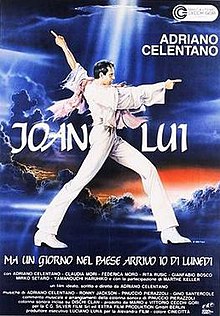Joan Lui
| Joan Lui | |
|---|---|
 Italian theatrical release poster by Renato Casaro | |
| Directed by | Adriano Celentano |
| Written by | Adriano Celentano |
| Produced by | Mario & Vittorio Cecchi Gori |
| Starring | Adriano Celentano Claudia Mori Federica Moro |
| Cinematography | Alfio Contini |
| Edited by | Adriano Celentano |
| Music by | Adriano Celentano Pinuccio Pierazzoli Ronny Jackson Gino Santercole |
Release date | 1985 |
Running time | 163 min 133 min (cut edition) 125 min (Home Video cut) |
| Country | Italy |
| Language | Italian |
Joan Lui (also known as Joan Lui - Ma un giorno nel paese arrivo io di lunedì) is a 1985 Italian musical-comedy film written, directed and starred by Adriano Celentano. It is the last of the four films written and directed by Celentano.
Plot
Title character Joan Lui is a singer who has come from another world to condemn the hypocrisy and atrocities of the Western culture. When he arrives in Italy, he seeks to create a musical group composed of young beginners to better spread his message. After having exposed the deception of a major musical producer, Joan Lui disappears into thin air. Meanwhile, the world is plunged into a terrible apocalypse.
Cast
- Adriano Celentano: Joan Lui
- Claudia Mori: Tina Foster
- Marthe Keller: Judy Johnson
- Federica Moro: Emanuela Carboi
- Edwin Marian: Cap. Arthur
- Gian Fabio Bosco: Winston
- Mirko Setaro: Musico
- Rita Rusic: Singer into the temple
- Haruhiko Yamanouchi: Jarak
- Piero Nuti: Franky
- Edoardo Romano: Prime Minister
- Sal Borgese: Frank
- Gino Cogliandro: Bartender
- Francesco Salvi: Journalist
- Romano Puppo: Assassin
Soundtrack
- L'uomo perfetto
- Sex without love
- Il tempio
- Mistero
- Lunedì
- Qualcosa nascerà
- Splendida e nuda
- L' ora è guinta
- La prima stella
Production
The film was also the center of a dispute between Mario and Vittorio Cecchi Gori and Celentano as the producers decided, a month after the first release, to replace the original cut with another version, with a different editing and lasting 30 minutes less.[1][2]
Reception
The film was a box office bomb, grossing 7.3 billion lire at the Italian box office in spite of a budget of about 20 billion lire.
The film also received generally bad reviews. Morando Morandini described it as "an enormous music video based on visual shock, jam-packed with music, with some monumental sets and elaborate editing. A true festival of kitsch also on an ideological level".[3] According to Paolo Mereghetti the film, "a personal reading of Christianity in musicals", was "a personal delusion of omnipotence", "a mock-apocalyptic madness that is just able to list the worst clichés of indifference".[4]
References
- ^ Roberto Chiti; Roberto Poppi; Enrico Lancia. Dizionario del cinema italiano: I film. Gremese, 2000. ISBN 8877424230.
- ^ Marco Giusti (1999). Dizionario dei film italiani stracult. Sperling & Kupfer. ISBN 8820029197.
- ^ Laura Morandini; Luisa Morandini; Morando Morandini. Il Morandini. Zanichelli, 2000.
- ^ Paolo Mereghetti. Il Mereghetti. B.C. Dalai Editore, 2010. ISBN 88-6073-626-9.
External links
